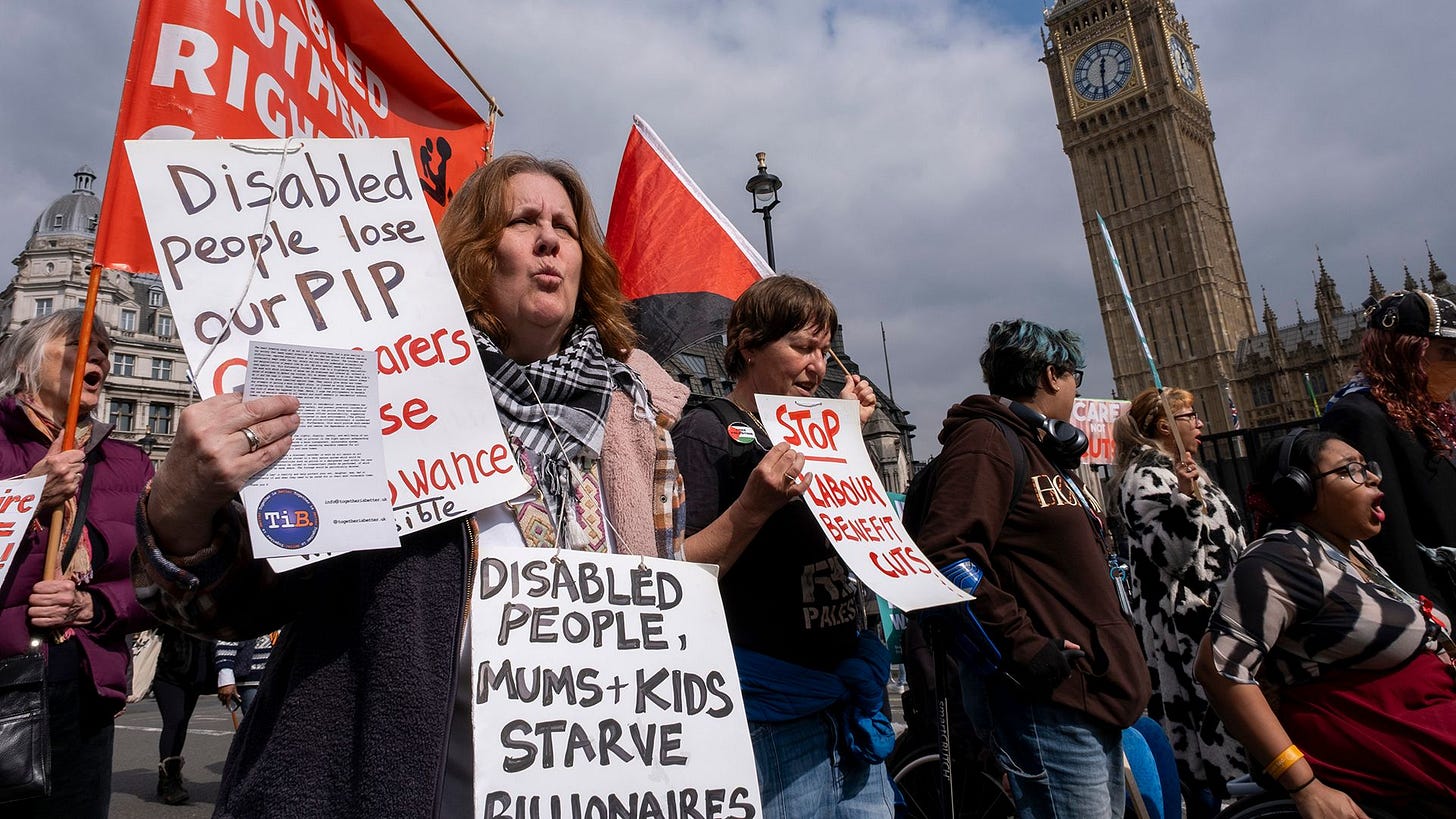As a child in the 1970s I was regularly told the apocryphal tale of King Canute who took his throne to the beach and commanded the tide to stop rising. Surrounded by his advisors, the powerful King was forced to retreat as the waters disobeyed and lapped at his feet. Hubris was vanquished by the hard facts of life.
Watching our Prime Minister, Sir Keir Starmer, in the House of Commons this week I realised that he was the King Canute of our times. His government is being slowly engulfed by the rising tide of welfare costs that is sinking the nation. This week, he was thwarted in cutting the payments given to disabled people. Soon the same will happen in his quest to cut the costs of educating children with additional needs.
At some point, Sir Keir and his advisors will have to take a step back and see the tsunami that is coming their way. They need to ask WHY so many people are now unable to become fully independent adults, earning and paying their own way in life.
The latest data indicate that about 4 million adults (1 in 10 people) claim the Personal Independence Payment (PIP) – that has been the focus this week. Successful claims are backed up by evidence of a diagnosis and its effects on personal capacity, often including testimonials from health and other professionals, and this would suggest that the problems are real.
Unless politicians start to understand and address the causes of these disabilities they will only ever be stranded in the rising tide that already engulfs every corner of public service provision and threatens the sustainability of the nation itself.
Politicians have been very poorly advised by the experts who should have told them the truth.
Since the 1990s, rates of autism and associated neurological diseases (including Alzheimer’s and Parkinson’s and Multiple Sclerosis (MS)), psychiatric disorders (such as schizophrenia, depression, anxiety and Obsessive Compulsive Disorder (OCD)) and related immune complaints (anaphylaxis, asthma, eczema and autoimmunity) have been going up, year after year.
When our son was diagnosed with severe autism in 2008 official rates were something like 1 in 150 – having risen from an estimated 2 to 4 in 10,000 in the 1960s and 70s. In Northern Ireland, the UK nation which keeps the best records, almost 6% of school aged children (or 1 in 17) are now autistic, with 80% of them having special educational needs of some kind.
Our son’s autism means he will never go to work. He required one-to-one assistance in two mainstream schools before moving to specialist schools (one private and two state-provided, all state-funded) with transport to get there and back. He receives the Personal Independence Payment (PIP) and the health top up to Universal Credit that were the targets for government attention this week. Since leaving school at 19, he has had an additional budget to pay for a team of carers who take him out and about costing £3000 every month. There are additional costs associated with his blue badge for parking, free medical and dental services and I have previously documented the long list of state-funded services that we have received.
Many children with the same diagnosis are less physically able than our son and have entitlements to a very cheap car. Those in single-parent households may also require access to social housing and/or housing benefit which further increases the costs to the state. A carers allowance is paid to those caring at home and this comes with a top up to National Insurance that secures a full state pension for the carer when they reach the official retirement age. Many parents are forced to stop working to care for their child and their loss of earnings and associated taxation, in addition to more Universal Credit and associated benefits, compounds the costs to us all.
Our son is just one disabled adult amongst millions. He is only 21 and has already cost the taxpayer an enormous amount. He will continue to do so for the rest of his life. Once we are dead, the costs will increase. I wish this wasn’t the case but we can’t just wish it away.
The experts employed in the National Health Service (NHS) and related quangos – and even those in some charities - have sold us the lie that this is perfectly normal. They tell us that autism has always been a facet of human society and we are just much better at spotting it now. They are proud that society recognises the autism of people who were misdiagnosed in the past. They pay researchers to find the ‘missing millions’ who were previously overlooked and need to be welcomed into the arms of the neurodiversity tribe.
Government has been a victim of this misinformation as much as the rest of us. The experts have pedalled lies that are now coming home to roost in the unsustainable balance sheets of national and local government.
Taking a cursory look at the budget of any local authority instantly tells you the truth. The accounts document the rising cost of special educational needs and the escalating costs of care for disabled young adults now leaving school. Indeed, there is a building bonanza underway as local authorities scramble to increase capacity in the special school sector for the least possible cost.
Private investors recognise the reality that government is slow to accept.
Reducing the generosity of benefits won’t change the situation a jot. Indeed, it seems odd that the Secretary of State for Work and Pensions even thinks that the problem is caused by people ‘gaming the system’ or ‘taking the mickey’ (as she put it in February) when confirmation of benefits is always dependent upon a professional diagnosis that comes direct from NHS or similar staff. What’s more, there is a growing queue of people waiting to access the assessment and diagnostic services provided by the NHS for conditions like autism, so the problem is set to get worse.
This week the government responded to criticism and public humiliation by kicking the ball of reform into the long grass of an ‘enquiry’ led by the Right Honourable Sir Stephen Timms MP that will ‘co-produce a plan for reform’ with representatives from the disabled community. This sounds lovely but it simply delays facing up to the problem for at least a year and a half. It also implies that you can ‘co-produce’ cuts in a budget with the people who depend on the money being spent. This is highly unlikely to be a success and will end up costing even more money to manage it all.
This week’s kerfuffle in the House of Commons has highlighted the extent to which Sir Keir and Secretary Kendall are being very badly advised. They desperately need a new set of experts who recognise the tsunami of neurological damage that is now so evident in our young people. They need advisors who have the courage to tell them that autism and other neurodegenerative conditions are crippling the nation. They need to insist that the experts, advisors, researchers and providers get a grip in identifying and solving the problem at source.
Despite what we were told as children, I now learn that King Canute went to the beach with his advisors to teach them a lesson. He felt they were flattering him and overstating his power. He needed advisors who could tell him the truth. Standing by the rising waters he demonstrated that his powers were weak in the face of the tide. His secular power was nothing when pitted against the greater powers of God and the sea. He showed humility and the practical wisdom of facing reality in the cold salty wind. He stood on the shore and declared: 'Let all men know how empty and worthless is the power of kings, for there is none worthy of the name, but He whom heaven, earth, and sea obey by eternal laws.'
Our nation is being failed by experts who refuse to face up to the facts. They pedal wishful thinking about the glories of neurodiversity, normalising the rising tide of severe neurodegenerative and psychological disability. Recognising and responding to the tsunami of neurological harms afflicting our children, young people and growing numbers of adults is critical to securing our future. There is no other way out.









When the truth comes out about the Autism epidemic and what`s causing it, this may be remembered for centuries to come.
We could have nearly 2 million young people harmed just in the UK alone over the last 30 years, the problem is it’s difficult to know how deep in mental health terms to the individual the cut is.
There's probably hundreds of thousands to a million young people with profound / severe autism ASD 2 and 3.
I regard anyone with IQ below 70 ( approx 40% of autism diag from CDC stats ) to have severe disabling autism regardless of the new profound term so that’s normally ASD 2&3.
However ASD 1 or Asperger's is no walk in the park with many crushing mental health problems of its own, many have even more hidden symptoms like the shy intelligent neurotic teenage girl with an eating disorder who is being assessed for ASD.
The 25 year old man with serious depression & poor social skills.
Where does high functioning Asperger's end?
When the dam bursts and the truth is known it will be like a social nuclear explosion, so much so that authorities will probably try to control or restrict the flow of information to the public or quietly make changes
Its personal for millions of people , not on the tv but someone’s child, brother , cousin etc.. , its difficult to judge how things will go from there.
Even those with mild autism & mental health problems will be very angry & want to have their day in court.
Why is there no alarm over always more special needs kids?
Look at what’s happening in Scotland:
In 2025, Scotland now finds 40 percent of schoolchildren have special needs.
In 2023, the Glasgow Herald revealed that 36.7 percent of Scottish students have special needs. https://www.heraldscotland.com/opinion/23988132.children-special-needs-number-one-priority/
That was up from 34.2 percent in 2022. https://www.scottishdailyexpress.co.uk/news/politics/snp-ministers-accused-shamefully-neglecting-28722232
And in 2024 research showed one in 23 Scottish children had a diagnosis of autism.
https://www.heraldscotland.com/news/24231397.scottish-schools-learned-accept-autistic-pupils/
In 2024 the Wales Mirage announced 47.9 percent of Welsh children have special needs.
https://www.miragenews.com/research-nearly-half-of-welsh-kids-have-1281927/
There are endless stories like this. I post them regularly on Loss of Brain Trust. https://www.lossofbraintrust.com
Councils across England are desperate to find resources to pay for all the special ed students, many with complex needs.
There is no real explanation for why there is always “greater demand” and “more complex needs” beyond claiming it’s due to “greater awareness.”
This is a societal and economic crisis that is only getting worse.